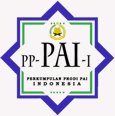Students’ Academic Integrity Index in Using Generative Artificial Intelligent among Islamic Education Major Students in Islamic Higher Education
Abstract
Full Text:
PDFReferences
Akkaş, Ömer Muhtar, Cansel Tosun, and Şahin Gökçearslan. 2024. “Artificial Intelligence (AI) and Cheating.” Pp. 182–99 in Advances in educational technologies and instructional design book series.
Alier, Marc, Francisco José García-Peñalvo, and Jorge D. Camba. 2024. “Generative Artificial Intelligence in Education: From Deceptive to Disruptive.” International Journal of Interactive Multimedia and Artificial Intelligence 8(5):5–14. doi: 10.9781/ijimai.2024.02.011.
Almassaad, Ahmad, Hayat Alajlan, and Reem Alebaikan. 2024. “Student Perceptions of Generative Artificial Intelligence: Investigating Utilization, Benefits, and Challenges in Higher Education.” Systems 12(10):385. doi: 10.3390/systems12100385.
Anon. 2024. “Redesigning Assessments in Business Education: Addressing Generative AI’s Impact on Academic Integrity.” International Journal of Science and Research 13(10):1761–65. doi: 10.21275/sr241021051659.
Barrientos, Aldrex A., Mercibelle A. Del Mundo, Hermie V. Inoferio, Mardiya A. Adjid, Hilda B. Hajan, Myrna M. Ullong, Devie Ruth S. Alih, Benjamar P. Abdulmajid, and Marcelino M. Espartero. 2024. “Discourse Analysis on Academic Integrity Generative AI: Perspectives from Science and Mathematics Students in Higher Education.” Environment and Social Psychology 9(9). doi: 10.59429/esp.v9i9.2927.
Dhruv, Ajay, Sayantika Saha, Shivani Tyagi, and Vijal Jain. 2024. “Investigating the Transformative Impact of Generative AI on Academic Integrity Across Diverse Educational Domains.” Proceedings - 2nd International Conference on Advancement in Computation and Computer Technologies, InCACCT 2024 4(1):87–92. doi: 10.1109/InCACCT61598.2024.10551108.
Duane, Aidan. 2024. “Can Artificial Intelligence Complete My Assessment? A Student Led Initiative to Stress Test the Academic Integrity of University Assessment Using Generative AI.” International Conference on Higher Education Advances 2(1):10–17. doi: 10.4995/HEAd24.2024.17143.
Farrelly, Tom, and Nick Baker. 2023. “Generative Artificial Intelligence: Implications and Considerations for Higher Education Practice.” Education Sciences 13(11). doi: 10.3390/educsci13111109.
Francis, Nigel J., Sue Jones, and David P. Smith. 2024. “Generative AI in Higher Education: Balancing Innovation and Integrity.” British Journal of Biomedical Science 81. doi: 10.3389/bjbs.2024.14048.
Furze, Leon, Mike Perkins, Jasper Roe, and Jason Macvaugh. 2024. “The AI Assessment Scale (AIAS) in Action: A Pilot Implementation of GenAI Supported Assessment.” ArXiv.Org abs/2403.1. doi: 10.48550/arxiv.2403.14692.
Gosling, Samuel D., Kate Ybarra, and Sarah K. Angulo. 2024. “A Widely Used Generative-AI Detector Yields Zero False Positives.” Aloma 42(2):31–43. doi: 10.51698/aloma.2024.42.2.31-43.
Guillén-Yparrea, Nicia, and Felipe Hernández-Rodríguez. 2024. “Unveiling Generative AI in Higher Education: Insights from Engineering Students and Professors.” IEEE Global Engineering Education Conference, EDUCON. doi: 10.1109/EDUCON60312.2024.10578876.
Întorsureanu, Iulian, Roxana Voicu-Dorobanțu, Codrin Florentin Nisioiu, and Cătălin Ploae. 2024. “Generative Artificial Intelligence and the Academic Integrity of Graduation Works in Economics–Exploring Perceptions of Romanian Academia.” Economic Computation and Economic Cybernetics Studies and Research 58(2):132–47. doi: 10.24818/18423264/58.2.24.08.
Kelly, Andrew, Miriam Sullivan, and Katrina Strampel. 2023. “Generative Artificial Intelligence: University Student Awareness, Experience, and Confidence in Use across Disciplines.” Journal of University Teaching and Learning Practice 20(6). doi: 10.53761/1.20.6.12.
Koren, Nadia, and Brent A. Anders. 2024. “Harnessing the Power of Generative Artificial Intelligence to Promote Academic Integrity.” Pp. 241–62 in Advances in educational marketing, administration, and leadership book series.
Lye, Che Yee, and Lyndon Lim. 2024. “Generative Artificial Intelligence in Tertiary Education: Assessment Redesign Principles and Considerations.” Education Sciences 14(6):569. doi: 10.3390/educsci14060569.
Lyons, Maura, Elise Deitrick, and Joshua Richard Coughlin Stowell Ball. 2024. “Characterizing Computing Students’ Use of Generative AI.” ASEE Annual Conference and Exposition, Conference Proceedings. doi: 10.18260/1-2--48453.
Mahmud, Saadia. 2024. “Fostering Academic Integrity in the Age of Artificial Intelligence.” Pp. 1–20 in Advances in educational marketing, administration, and leadership book series.
Meakin, Lynsey A. 2024. “Embracing Generative AI in the Classroom Whilst Being Mindful of Academic Integrity.” Pp. 58–77 in Advances in educational marketing, administration, and leadership book series.
Plecerda, Lanie P. 2024. “Academic Integrity Surrounding the Use of Generative AI in Higher Education: Lenses from ICT College Students.” Environment and Social Psychology 9(12). doi: 10.59429/esp.v9i12.3177.
Ramasamy, Tharunbalaaje. 2024. “Ai in Higher Education.” Interantional Journal of Scientific Research in Engineering and Management 08(06):1–5. doi: 10.55041/ijsrem35591.
Saqib, Muhammad Bilal, and Saba Zia. 2024. “Evaluation of AI Content Generation Tools for Verification of Academic Integrity in Higher Education.” Journal of Applied Research in Higher Education. doi: 10.1108/JARHE-10-2023-0470.
Shchedrina, Mariia. 2024. “Peculiarities of Use of Generative Artificial Intelligence in Codes of Academic Integrity in Higher Education Institutions of Singapore.” International Scientific Journal of Universities and Leadership (17):154–63. doi: 10.31874/2520-6702-2024-17-154-163.
Tan, Myles Joshua Toledo, and Nicholle Mae Amor Tan Maravilla. 2024. “Shaping Integrity: Why Generative Artificial Intelligence Does Not Have to Undermine Education.” Frontiers in Artificial Intelligence 7. doi: 10.3389/frai.2024.1471224.
Wecks, Janik Ole, Johannes Voshaar, Benedikt Jost Plate, and Jochen Zimmermann. 2024. “Generative AI Usage and Academic Performance.” SSRN Electronic Journal.
Wiredu, Japheth Kodua, Nelson Seidu Abuba, and Hassan Zakaria. 2024. “Impact of Generative AI in Academic Integrity and Learning Outcomes: A Case Study in the Upper East Region.” Asian Journal of Research in Computer Science 17(8):70–88. doi: 10.9734/ajrcos/2024/v17i7491.
DOI: http://dx.doi.org/10.24014/potensia.v9i2.37740
Refbacks
- There are currently no refbacks.
Copyright (c) 2025 POTENSIA: Jurnal Kependidikan Islam

Potensia: Jurnal Kependidikan Islam
E-ISSN: 2442-5605
Published By:
Fakultas Tarbiyah dan Keguruan Universitas Islam Negeri Sultan Syarif Kasim Riau, Indonesia
Mailing Address:
Jl. H.R Soebrantas Km. 15 No. 155 Kelurahan Simpang Baru Kecamatan Tuah Madani, Pekanbaru, Riau, Indonesia
email: potensia.ftk@uin-suska.ac.id
Indexed By:
POTENSIA: Jurnal Kependidikan Islam is licensed under a Creative Commons Attribution 4.0 International License.

_-_Copyy2_(1)_copy1.jpg)



.jpg)
.png)
.jpg)
.jpg)




